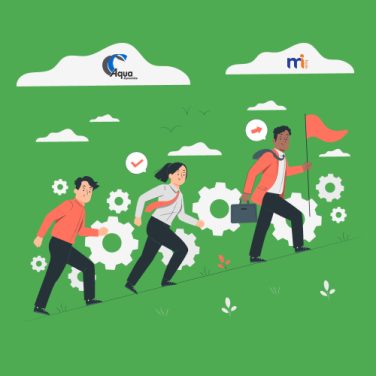AI-driven technologies have the potential to transform workplace dynamics by offering data-driven insights, automating routine tasks, and optimising recruiting and training processes.
However, as AI continues to revolutionise HR practices, organisations must navigate the legal risks associated with its integration.
Balancing innovation and regulation
While AI presents numerous advantages such as increased efficiency and cost-effectiveness, its deployment must be balanced with adherence to existing legal frameworks to avert potential pitfalls.
Issues like data privacy and the risk of discrimination are at the forefront of legal considerations in AI-driven HR models.
To ensure responsible use, HR leaders must be well-versed with regulatory landscapes governing data protection and non-discrimination laws. By doing so, they can harness AI’s power responsibly while safeguarding their organisation against legal challenges.
The key lies in balancing AI’s transformative capabilities with a robust compliance strategy, ensuring that the benefits outweigh the legal risks involved.
As organisations embark on this journey, MiHCM solutions are pivotal in aligning AI applications with local labour laws. These tools not only ensure compliance but also facilitate a smoother integration of AI into HR operations, enhancing productivity and regulatory assurance.
AI-driven efficiency and legal concerns

Incorporating AI into HR processes opens up several legal risks that must be addressed. Legal concerns primarily stem from instances of bias and discrimination in AI-driven HR tools.
For example, algorithms might inadvertently favour candidates based on historical hiring data that reflects existing biases. Hence, the significance of establishing stringent measures to ensure fairness and equality in AI applications cannot be overstated.
Key points to consider:
- Algorithmic fairness: Ensure AI algorithms are regularly audited to identify and eliminate bias, guaranteeing fair outcomes for all candidates.
- Transparency: Maintain transparency in AI processes, allowing stakeholders to understand how decisions are made and ensuring adherence to non-discrimination laws.
- Data protection: Protect employee data by complying with data privacy regulations such as the GDPR. This is essential to avoid hefty penalties and protect company reputation.
- Employee training: Educate HR personnel on the ethical use of AI tools and encourage them to question and intervene when necessary.
Leveraging MiHCM for compliance and productivity
MiHCM solutions are designed to address these concerns by enhancing both compliance and productivity.
With features such as HR analytics that provide insights into diversity and inclusion, companies can transform workforce dynamics while adhering to local labour laws. By facilitating compliance and ensuring data security, MiHCM’s suite of solutions helps organisations harness the power of AI responsibly, turning compliance into a strategic advantage.
Integrating AI in HR presents a dual challenge of maximising benefits while mitigating risks. By leveraging effective tools like those from MiHCM, combined with a focus on ethical practices, organisations can navigate the complexities of AI legal risks in HR with confidence, ensuring sustainable success and innovation.
Importance of data privacy in AI

The integration of AI in HR necessitates a keen awareness of the importance of safeguarding data privacy.
With the enactment of laws like the General Data Protection Regulation (GDPR), organisations are mandated to ensure stringent data protection protocols. These regulations demand transparency in data handling processes and assign clear accountability for data breaches, making compliance non-negotiable.
Key considerations for maintaining data privacy in AI:
- Conduct regular audits: Regularly review data-processing activities to ensure compliance with local and international regulations.
- Data minimisation: Collect only the information that is necessary for specific HR processes.
- Secure data storage: Implement robust encryption and security measures to protect employee information.
- Employee awareness: Educate employees about their rights concerning personal data to foster trust and compliance.
Navigating non-discrimination laws
While AI presents opportunities for efficiency, it also poses risks concerning bias and discrimination if algorithms are not carefully managed. Non-discrimination laws are designed to prevent biased decisions in employment based on race, gender, orientation, or other protected characteristics.
AI systems must be designed to circumvent existing biases in data-driven decisions. For instance, if historical datasets are biased, algorithms are likely to replicate those biases, leading to unfair outcomes. Therefore, HR must implement rigorous checks to ensure AI decisions are fair and comply with all applicable non-discrimination laws.
Strategies to address discrimination risks in AI:
- Bias detection: Employ bias detection technologies to regularly analyse AI decisions for signs of discrimination.
- Diverse data: Train AI models on diverse datasets to prevent the perpetuation of historical biases.
- Transparency in AI models: Develop transparent AI systems where stakeholders can understand decision-making processes.
- Continuous review and governance: Establish an ongoing review process and governance policy to ensure ethical AI deployments.
Validating AI systems for HR use
- Algorithm audits: Conduct regular audits of AI algorithms to detect and mitigate any biases, ensuring equitable treatment for all employees.
- Regulatory alignment: Align AI practices with existing local labour laws and data protection regulations to prevent legal infractions.
- Performance monitoring: Establish metrics to evaluate AI performance, ensuring that it meets predefined success criteria and contributes positively to HR accountability.
- Feedback loops: Incorporate feedback mechanisms that allow stakeholders to report any discrepancies or ethical concerns related to AI system outputs.
| Key Area | Description |
|---|---|
| Algorithm transparency | Ensure transparency in AI algorithms to foster trust and meet non-discrimination requirements. |
| Data encryption | Utilise strong encryption standards for sensitive employee data to protect against breaches. |
| Continuous learning | Keep HR and technical staff updated with AI developments and legal guidelines through ongoing training programmes. |
| Custom analytics solutions | Employ tailored analytics to address specific HR compliance needs, tracking legal compliance metrics effectively. |
Staying ahead in the regulatory game
Being ahead means more than adjusting to legal updates; it involves strategic foresight.
Companies should implement rigorous monitoring mechanisms, frequently evaluating AI impacts on HR functions to pre-emptively identify and mitigate risks. Investing in continuous learning for both algorithms and employees will equip organisations to adapt efficiently to disruptions.
Moreover, cultivating a culture of ethical AI usage is integral. Businesses should not only comply with existing norms but also champion transparency and fairness in AI applications. Collaborating with legal experts and engaging in industry discussions can offer insights into future developments, ensuring preparedness and agility.
HR’s integration with AI is undeniably transformative, but success hinges on a mindful balance of technological benefits and legal adherence. By attention to future regulatory trends, organisations can safeguard themselves against legal challenges, setting new benchmarks in ethical AI application within the HR domain.
Leveraging ethical implications of AI in HR in strategic planning can further solidify an organisation’s position as an industry leader and a proponent of responsible AI use.



